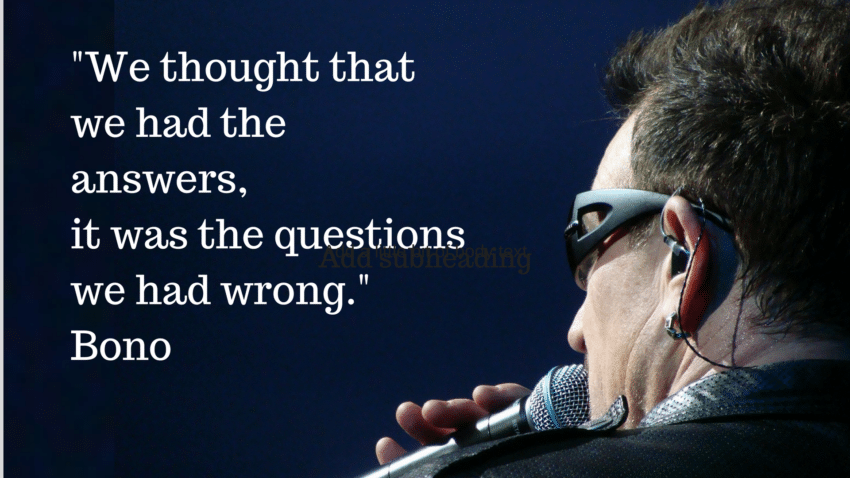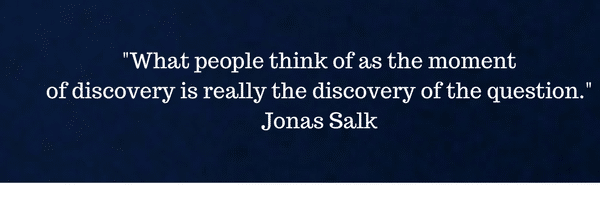
Several years ago, when I started to reinvent my business, I faced a sea of unknowns and many questions. I wondered: What was calling to me? How would my passion for story, or performance, fit into my leadership development work? Where would my work be most useful, valued and needed? Would I be marketable at all? What should I do to learn and develop my practice?
Starting out on a voyage of uncertainty and upheaval in my career, I figured that the sooner I could get to the land of answers the better. After all, time was running out! I had just turned turned 60. Surely all the personal growth, prayer, and contemplation I had done, together with my maturity and the earnestness of my quest, would serve to help me find my answers quickly.
I now smile at my hubris.
Because the big questions, the ones worth living into, don’t give up their answers just because we are in a hurry.
Instead I watched the years tick away. Questions didn’t seem to care about my timetable. I received information and answers, but they came at their own pace, not mine. I learned to stay open, curious and wait. (More truthfully, I did the best I could.)
Write out your questions
I have a great new client who’s just entering the discovery phase of her career reinvention process. As she sets out to interview people and check out new options for herself, I suggested that she make a list of the questions she wants to explore.
Listing the questions is a powerful tool, especially when it leads you to the bigger questions, the ones underlying your initial questions.
You may start with “What…?” and “How do I…” questions, and then find yourself discovering new “Why…” questions.
If you want to try this, take a sheet of paper and write forty questions about a subject that is important to you (like your life, your work, your relationships). If forty come easily for you, keep going. One teacher I worked with insisted that I write out a hundred questions. That was a stretch. As you start to get tired of question writing, keep going. Just when you feel as if your questions are getting repetitive or silly, that lone question that’s going to be really useful could jump out at you.
When you’re done, review your list. What questions have you missed? Which ones inspire you? Which ones make you curious? Those are the questions that can point the way forward.

Permission to ask the big questions
Last week, I was applying to be considered for a cool conference sponsored by author and podcaster Krista TIppett, a champion of big questions. Instead of asking “Why do you want to go to this conference?” questions, the application asked:
“We live in a moment of uncertainty and change – of vast open questions at the heart of our life together. Rilke spoke of “living the questions.” What questions would you like to pose, hold, and live with others in the period ahead?*
That made me think. And for a moment, while filling out the application, I stepped away from the obsessive, small questions I live with like “which garden bed most drastically needs my attention?” “What’s for dinner?” and “Is there gluten in the salad dressing?” and took a moment to think.
I wrote out a few unapologetically big and maybe uncool-to-chat-about-at-parties questions that I really care about, such as:
- How do we embrace the pain of the world, and feel the gross inequalities without surrendering to despair?
- How do we stay connected to what’s happening in the news, including our crazy politics, while staying connected to our own hearts and inner work?
- How do I acknowledge the benefits I’ve received from being white while reaching out across interracial and intercultural divides?
Fortunately, I was only given 600 characters for my answer, because I could have kept going.
 As today’s daily political quagmires are reported through the news, we’re presented with a near constant stream of allegations and disturbing news bites, and it’s hard not to be reactive. (“That’s bad.” “That’s really bad.” Do you realize how really bad that is?”) I feel taunted to come up with quick, easy responses.
As today’s daily political quagmires are reported through the news, we’re presented with a near constant stream of allegations and disturbing news bites, and it’s hard not to be reactive. (“That’s bad.” “That’s really bad.” Do you realize how really bad that is?”) I feel taunted to come up with quick, easy responses.
But what if we could slow it all down and look for the questions that could take us underneath all the chatter?
What is we started with just one question: “What are the questions we should be asking?”
What’s your big question? I’d love to hear.









